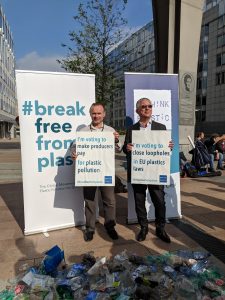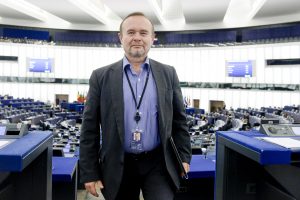I have no intention of running in the next elections for the European Parliament, but I will use the rest of my term to work on the topics that are of major importance to the citizens of Croatia and the EU, to the best of my abilities, says Davor Škrlec Croatian depute in Europiean Parlament.
The next European elections will take place from 23rd to 26th May 2019. A total of 705 MPs will be elected for the next parliament convocation, and Croatia will have 12 instead of the current 11 MPs.

Are you planning on running in the next election and what does that depend on?
The 2019 elections for the European Parliament are being increasingly reported about in the media, and as a result, the interest shown by the general public and citizens is growing too. I think that, at this moment, it would politically and morally correct for me to state what my intentions are. Although I have been an independent MP for two years, I do not consider this to be an obstacle or an insufficiency in running as a candidate in the next elections, and in that context, I already had serious discussions and offers.
It is enough to see the results olf my work published on the MEP Ranking website, which monitors activities of MPs and ranks them accordingly, to conclude that I am a desirable partner. If you look at the results expressed in total points, I occupy the solid 4th place.
However, if you look at my work in the most complex committees and taking into account the number of reports and opinions that I have been a rapporteur on, then I occupy the second place in the Croatian delegation in terms of the number of reports and the first place in the number of opinions. Nevertheless, I have decided, for personal reasons, not to run in the next elections for the European Parliament and to focus more on doing the best work I can at the European Parliament until the end of my term, and for my work to be as productive and useful as possible to the citizens of the Republic of Croatia and the EU, especially because important decisions regarding the EU’s multi-annual financial framework for the period 2021-2027, particularly regarding the EU structural and investment funds, are being made at the moment.
2. Since you have been an independent MP in the last two years, does that give you more freedom in advocating the positions you support?
Firstly, it leaves me with more time I can spend on working at the European Parliament, because when I was the vice president of my political party, my private life suffered a lot because I had a lot of obligations. I definitely have more freedom in advocating my positions and the freedom in choosing the topics to be discussed in the Parliament. I also have more freedom in how I communicate with the general public and citizens. Although it is customary for a European Parliament deputy to vote in accordance with the agreed positions of its caucus, the European Parliament’s Code of Conduct says that MPs vote according to their conscience and cannot be penalized if they vote against the interest of their particular parliamentary caucus. I was a rebel, so to speak, on several occasions and voted against the wishes of my parlilamentary caucus – the Geen Party. Probably the most glaring example of this is my vote regarding the CETA, the comprehensive trade and investment agreement concluded between Canada and the EU.

3. What was your biggest contribution during your term as an European MP?
Prior to the elections for the European Parliament in 2014, I stated that, during that particular convocation of the European Parliament, the EU would determine its climate and energy policies for the period up until 2030, and if I were given the opportunity, I would actively participate in the creation of these policies. I succeeded in that because I became a group reporter for the entire legislative package pertaining to circular economy and partly for the legislative package of the Energy Union, in the electricity market segment. I am also a member of the two most influential committees in the Parliament: the Committee on the Environment, Public Health and Food Safety (ENVI) and the Committee on Industry, Research and Energy (ITRE) where I am the only representative from Croatia.
As a substitute member of the Committee on Regional Development (REGI), I focused my activities on the macro-regional strategies of the EU and the application of the EU cohesion policy, which are two very important topics for Croatia’s development and the successful use of EU funds. At that particular committee, I was the Parliament’s rapporteur on the opinions on cohesion policy and the circular economy, so I created a connection between the main topics I worked on as a member of the ENVI and ITRE committees and the financing and implementation of the REGI committee, with the emphasis on bolstering the local economy and entrepreneurship. I have succeeded in highlighting the topics that are significant for Croatia: a sustainable and accessible tourism presented at the conference in Split and the Via Dinarica exhibition in Brussels, as well as the topic of railway development and electrification at a very successful conference in the Croatian Parliament.
I would outline four more activities that encouraged Croatian citizens to become more active in the everyday functioning of the EU, through which I also managed to achieve good cooperation with associations in Croatia – the campaign against sea waste, the amendments to the Law on Animal Protection (no-kill dog shelters), the campaign against the use of glyphosate and my most recent activities that are of interest to all citizens of Croatia, which is participating in a successful campaign to abolish daylight saving time, that is, to stop the practice of changing clocks twice a year. As my work on important legislative acts in the area of the EU Multiannual Financial Framework ends in April 2019, just before the elections, I believe that I will finish the tasks on my list by then.
4. Are the topics you cover, like ecology or food safety, recognized as important by the Croatian government?
Since I have been and in some instances, still am a rapporteur on circular economy, energy union and MFF, on behalf of my parliamentary caucus, the Green Party, I am sorry to say that there is no cooperation with the Croatian government whatsoever.
Even after certain legislative documents were published in the Official Journal of the EU, there was no positive response to my initiatives to make use of the resources I have available as a representative in the European Parliament for the purpose of better informing and educating public administration, businesses and citizens on changes and opportunities stemming from the EU policies. The only positive experience I have had was with the Minister of Agriculture, Mr. Tolušić and the Minister of Regional Development and EU Funds, Mrs. Žalac. Minister Tolušić recognized my anti-glyphosis campaign as important for healthy food production in Croatia which subsequently led to a change of the Republic of Croatia’s official stance in the EU bodies. He also supported my advocacy for no-kill animal shelters which was incorporated in the Law on Animal Protection. I have established an excellent cooperation with the Croatian Chamber of Economy and a number of associations in Croatia, as well as with individual citizens.

5. How successful was Croatia in improving its position in terms of circular economy, which is a topic you have dealt with a lot?
Unfortunately, there are no positive shifts. The cause of this lies in the perennial neglect of the waste management sector by the state, regional and local authorities, which often favoured certain interest groups, contrary to the public interest. Obsolete solutions are still being proposed; namely, the solutions that will cause Croatia to fail to achieve the desired rate of waste reduction and to increase the separate waste collection and recycling rate. In addition to environmental damage, it will cause even an greater damage to the economy, because no jobs will be created as a result of the good implementation of EU policy on the circular economy and energy union, which is connected to it.
6. We have recently heard unpleasant news about the Adriatic Sea being in a very difficult situation. How well does Croatia use the EU’s know-how and resources in resolving such problems?
At the plenary session in September, we adopted the European Parliament’s report on the European strategy for plastics in the circular economy, as presented by the Commission in January this year. By 2030, all plastic packaging used in the EU should be recyclable, and the consumption of disposable plastic has to be drastically reduced. The key goals of the strategy are to reduce the amount of plastic waste, make recycling more profitable for business, stop sea pollution, and encourage investments and innovation. Plastics are widely used in our daily lives due to their low prices and a wide range of practical applications. However, plastics, and in particular disposable plastics, are often produced, used and discarded in a way that does not take into the account economic benefits of a circular approach and as such, they becomes harmful to the environment.
At the end of October, the European Parliament voted to ban a whole range of plastic products that contribute to the destructive and toxic pollution of the environment, the river and the sea. The adopted report is a continuation of the ambitious proposal made by European Commission in May regarding the reduction of plastic waste, called the Disposal Plastics Directive. The European Parliament is currently negotiating with the European Commission and the Council of the European Union in order to agree on the final text of the Directive by 2019. One of the proposed measures is the complete ban on plastic items for which there is already an alternative available in the market, such as ear-cleaning buds, plastic cutlery and plates, straws and balloon sticks. The report also obliges Member States to reduce the use of products such as disposable coffee cups and plastic food containers by 25% by 2025, and a wider responsibility for the manufacturers of wrappings, filters for tobacco products, wet wipes and the like. Following the initiative by the Green Party / ESS, we are demanding a ban on dangerous oxo-plastic products that are promoted as biodegradable but are, actually, disintegrating into micro-plastic and as such, are entering the food chain. This is a victory in the fight against the use of disposable plastic. Still, there is a long road ahead in stopping our planet from suffocating under the weight of our own rubbish.

7. What are the main messages to the government and the citizens in relation to the European agenda and what should be done and changed in the legislation, awareness, etc …?
The main message to the Government of the Republic of Croatia is that it is not enough to say to the citizens that it’s a good thing that Croatia is an EU member because now citizens can travel freely and work in the EU which resulted in the exodus of young people and families in search of better jobs and higher living standard. The Government also needs to talk about the need to reduce corruption at all levels, to make the justice system fairer and better, and investing more effort into in the proper, quality implementation of EU public policies, not just on cosmetic changes in legislation. The EU has no alternative because for small countries like Croatia, it means development in a safe environment. That is why citizens need to make effort when it comes to elections and recognize which political parties and candidates are just talking about keeping promises, and which are talking about projects that can be realized for the benefit of all, and not just individuals.